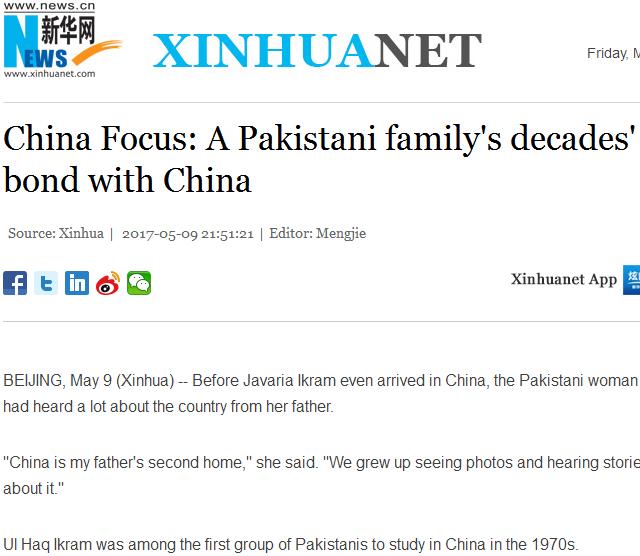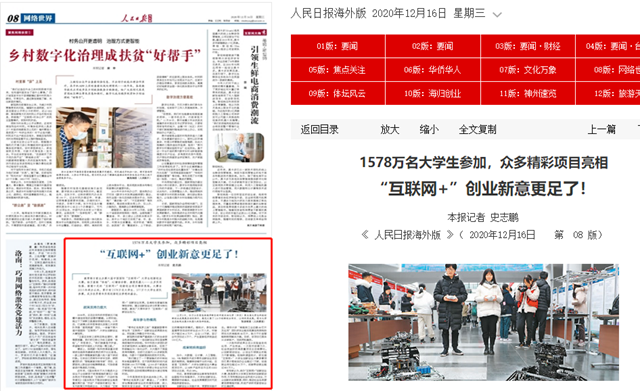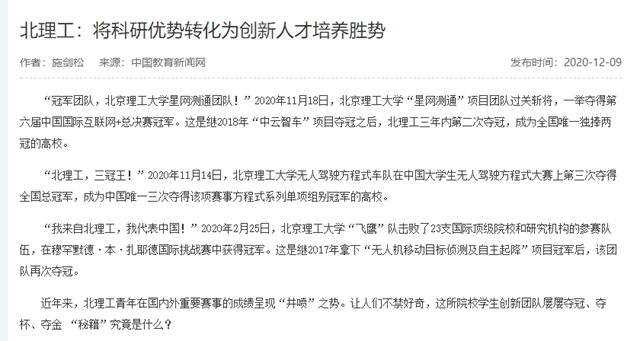【新华网】China Focus: A Pakistani family's decades' bond with China
华体会体育(中国):2017-05-12 供稿:新华网 编辑:杨晶 审核:王征 阅读次数:
原文标题:China Focus: A Pakistani family's decades' bond with China
原文链接:http://news.xinhuanet.com/english/2017-05/09/c_136269264.htm?from=groupmessage&isappinstalled=0

BEIJING, May 9 (Xinhua) -- Before Javaria Ikram even arrived in China, the Pakistani woman had heard a lot about the country from her father.
"China is my father's second home," she said. "We grew up seeing photos and hearing stories about it."
Ul Haq Ikram was among the first group of Pakistanis to study in China in the 1970s.
From 1974 to 1979, he studied Chinese and radio communications at Beijing Language and Culture University and Tianjin University. He then returned home and became an engineer in the military. In 2005, he came to China again, this time earning his doctorate at Beijing Institute of Technology.
Ul Haq Ikram has travelled around the country with his family, and encouraged his six children to study there.
"The peaceful environment and friendship between our two countries are the main reasons why we like China," said Ul Haq Ikram. "I enjoyed the academic atmosphere here, the teachers made our studies and daily life easy."
Javaria Ikram, 30, and her siblings all followed in the footsteps of their father. Elder sister Maria Ikram came first, earning her doctorate at Beijing Institute of Technology.
"Before arriving, I had been told Chinese are quite industrious," Maria Ikram said. "It is true. They work very, very hard."
When she arrived in 2005, Beijing had only several metro lines. "Now underground covers the whole city," she said.
Javaria Ikram came in 2008, and will complete her doctorate this June.
She told Xinhua that when she arrived, she could barely understand Chinese. "Sitting in class, I had no idea what the teacher was talking about," she said.
When Javaria Ikram told her teacher that she could not read Chinese characters, the teacher gave her an English version the next day.
"I gradually gained confidence," she said. "I will never forget this experience."
The sisters' husbands also studied in China. Both Maria Ikram and her husband Abdul Waheed are now professors at Beijing Institute of Graphic Communication. Javaria Ikram's husband Syed Hammad Hussain Shan Bokhari works for a Beijing company developing automotive electronic equipment. Javaria Ikram hopes to find a job as well.
"We would like to be a bridge for exchange between China and Pakistan," she said.
"In the past, young Pakistanis liked to study Arabic, French and German. Learning Chinese is a new trend," she said.
Chinese language courses for foreigners are now available in many colleges and even primary schools in China. The booming economy has attracted an increasing number of foreign students, and like the Ikram family, many have benefited from Chinese government scholarships.
In 2016, more than 440,000 foreign students from 205 countries and regions studied in China, according to statistics with the Ministry of Education.
According to plan, China will set up a Silk Road scholarship, allowing 10,000 foreign students from countries along the Belt and Road to study in China each year.
With the implementation of the Belt and Road Initiative, the China-Pakistan Economic Corridor will be developed, creating a lot of job opportunities for technicians, especially those who have studied in China, Javaria Ikram said.
She hopes the corridor will improve the economic and living conditions in Pakistan.
"Blackouts often occur in Islamabad due to power supply shortages," she said.
The cooperation mechanism will carry out many infrastructure and cultural projects, which will improve the quality of life in her hometown, Javaria Ikram said.
北京,5月9日(新华)—— 早在扎维利亚·伊克拉姆(Javaria Ikram)来到中国之前,这位巴基斯坦的女性就已经从她的父亲口中了解了中国的许多事情。
“中国是我父亲的第二个家,”她说,“我们是看着中国的照片,听着中国的故事长大的。”
乌尔哈克·伊克拉姆(Ul Haq Ikram)是上世纪70年代最早来华学习的巴基斯坦人中的一员。1974至1979年,他在北京语言大学、天津大学学习汉语以及无线电通信。之后,他返回家乡,成为了一名军队工程师。2005年,他又来到中国,在华体会体育攻读博士学位。乌尔哈克·伊克拉姆带着他的家人游遍中国,并鼓励他的六个孩子来中国学习。
“平和的环境以及中巴的深厚友谊是我们喜爱中国的主要原因,”乌尔哈克说道,“我享受这里的学术氛围,这里的老师让我们的学业、生活都变得更加轻松。”
30岁的扎维利亚·伊克拉姆和她的兄弟姐妹们都和她们的父亲走了一样的路。大姐玛利亚·伊克拉姆最早来中国,她在华体会体育攻读博士学位。
“在来之前,我就听说中国人民十分勤劳,”玛利亚·伊克拉姆说,“确实如此,他们工作非常非常认真。”
伊克拉姆说当她于2005年刚到中国时,北京只有几条地铁线路。“现在地铁覆盖了整个城市。”
扎维利亚于2008来到中国,今年6月,她将完成她的博士学位。她告诉新华网,当她刚到中国时,几乎无法理解汉语。“我坐在教室里,却完全不知道老师在说什么。” 当扎维利亚告诉她的老师她不识汉字时,她的老师在次日便给了她一份英文版的材料。“我渐渐获得了自信,”对此她说道,“我永远不会忘记这段经历的。”
扎维利亚和她姐妹的丈夫也曾在中国学习。而现在,玛利亚·伊克拉姆和她的丈夫阿布杜拉·瓦黑德(Abdul Waheed)均是北京印刷学院的教授。扎维利亚的丈夫,希德·哈马德·侯赛因·尚·博客里(Syed Hammad Hussain Shan Bokhari)在一家北京的公司从事汽车电子设备开发工作。扎维利亚也希望找一份工作。
扎维利亚说道,“我们很愿意成为中巴交流的桥梁。在过去,巴基斯坦的年轻人喜欢学习阿拉伯语、法语、德语。现在,学习汉语则成为了新的趋势。”
如今,针对外国人的汉语语言课程出现在中国的许多高校甚至是小学中。不断繁荣的经济吸引了越来越多的外国学生。此外,像伊克拉姆家族一样,许多外国学生享受到了中国政府奖学金的优惠。
在2016年,根据教育部统计,共有来自205个国家和地区的超过440000外国学生在中国学习。根据计划,中国将会建立丝绸之路奖学金。奖学金每年可资助来自一带一路沿途国家的10000名外国学生来华学习。
扎维利亚·伊克拉姆认为,随着一带一路计划的实施,中巴经济长廊将会继续发展,并为技术人员,特别是在中国学习过的人们提供了许多工作机会。
她希望中巴经济长廊能够改进巴基斯坦的经济和生活状况。“由于能源供应不足,伊斯兰堡地区经常断电。”扎维利亚·伊克拉姆认为,中巴合作机制将启动许多基础设施建设以及文化项目,这将会改善她家乡人民的生活质量。
分享到:

